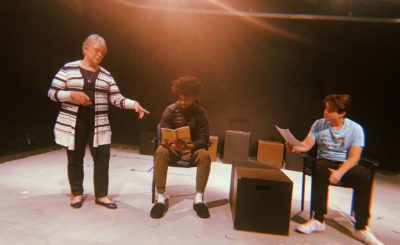
By Erica Kitchen for the YJ
The counselling center in Sullivan greets students with bulletin boards of information and hallways decorated with foam flowers. The cold white walls are sterile. Robin Tabor’s office is no different. There’s baubles on her desk and a bowl of candy, but the white walls betray the purpose of the space.
As West Virginia’s opioid crisis grows, its effects are creeping its way onto campus and in student lives. The increase of prescription drugs making their way into the state is a cause for concern among students. Many are reaching out for help.
Counselor Tabor can provide that service, and she says students come to her seeking advice for family and friends. Some have concerns about the needle-exchange program and its effectiveness. Others need advice on how to help a family member. “There’s educational groups, there’s support groups, there’s even online groups if you don’t want to go in person,” Tabor said.
Tabor is a woman with the aura of a favorite kindergarten teacher. Her eyes are painted a soft baby blue. Past the makeup is sincerity shining in her eyes. She’s the perfect image of a counselor. She’s someone that creates an easy atmosphere and is immediately trustworthy. When she speaks, she leans forward on her desk and talks in a near-whisper. She uses her hands to emphasize her words.
“Seek help. There’s plenty of help available if you’re willing to work the program,” Tabor said. She advises that students in need of help visit the counselling center on campus. She also emphasized the importance of drug education as a way to combat the problem.
Understanding the problem is the key to solving it. — Robin Tabor
Tabor has been a counselor for 17 years and teaches a peer education class at State on violence prevention, safe sex, and drugs and alcohol abuse. She also emphasizes the Good Samaritan Law that allows anyone to legally administer naloxone so long as they call 9-1-1.
Her soft-spoken words have fire behind them. “Educate,” Tabor says with emphasis. She repeats the word twice more. “Understanding the problem is the key to solving it.” Her clenched fists show passion for her job and the students under her care.
Naloxene, Training Available
In case of a campus overdose, security officers are equipped with naloxone. Students are typically sanctioned and required to come to counselling. If a student needs help with substance abuse, they are referred to long-term treatment centers at Prestera Center or Thomas Memorial Hospital.
State additionally offers Naloxone training on campus that is open including the Health Expo on April 17 with Lindsay Acree of the Kanawha-Charleston Health Department.
The flood of opioids hasn’t slowed down. As reported by the Charleston Gazette-Mail, 20.8 million prescription painkillers were shipped to Williamson, a town of 2,900 people, between 2006-2016 or 6,500 pills per person.
West Virginia had the highest amount of opioid-related deaths in 2016, as reported by the Centers for Disease Control and Prevention. Tabor says opioids are different from street drugs. “The people that are using now, they’re not using it to get high—they’re using it to feel normal.”
Related Stories:
Opioid Crisis Costs West Virginia $8.8 Billion Annually — WV Gazette-Mail
America’s opioid crisis has become an “epidemic of epidemics” — Vox


